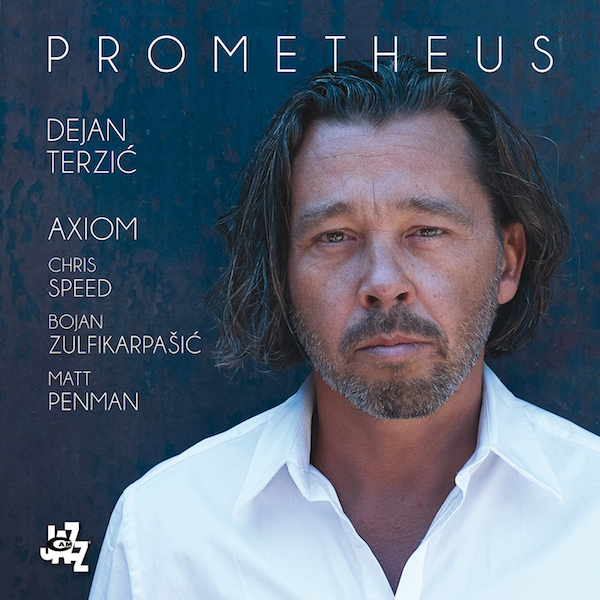DEJAN TERZIC AXIOM w BOJAN Z CHRIS SPEED MATT PENMAN
"PROMETHEUS"

CHRIS SPEED sax
BOJAN Z pno, fender rhodes
MATT PENMAN bs
DEJAN TERZIC dr/comp
Release NOV 18.2016
CAMJAZZ
CD Release: Dejan Terzic AXIOM w Chris Speed, Bojan Z, Matt Penman
“PROMETHEUS” (DEJAN TERZIĆ)
LINER NOTES by Brian Morton
I bumped into an old friend the other day, and reminisced. We’ve known one another, off and on, for twenty years or so and always seem to have that comfortable ability to pick up where we left off, without awkward personal bulletins and catch-ups. But we’re damned if we can remember where we met. He thought one place, one time, but I know I wasn’t there. I thought maybe when we both worked for the BBC, but it was in different cities and departments. We just sort of got to noticing one another and drifted into friendship.
Same thing with Dejan Terzić. I can’t remember where I first heard him play. It may have been at a festival in Poland in the 90s. It may have been on a Dusko Goykovich album. It may be that I’d heard other things, murmured “Nice drumming” and never bothered to check out the player’s name. The important thing, though, is that over time, he has become a warmly welcomed and familiar presence on all sorts of projects, his distinctive and highly musical voice easily picked out of the ensemble, in the same way that an old friend’s voice echoes up a stairwell or separates itself from party hubbub, which is what happened last week.
And here he is with an album under his own name, where it’s not just a matter of practising that rather self- conscious form of connoisseurship – and we’re all guilty of this at some time or other – that insists on picking out the drums rather than the star horn player who’s fronting the band. There’s a star horn player on Prometheus. Chris Speed is a great example of what’s called nominative determinism, which says that you tend towards jobs that fit your name. It’s not speed of fingers in his case so much as speed of thought. He’s among the most intelligent of contemporary players, always intriguing in his note-choices and deft in his execution of them. Likewise Bojan Zulfikarpašić. I know exactly where I first came across his name. It was during a live radio broadcast where I had to back-announce a track from a new album with no help from the BBC pronunciation unit. It was with some relief that the next time he came up, it was as Bojan Z. And Matt Penman, one of those bass players who has gone from being Mr Dependable to being Mr Remarkable, always capable of playing with time rather than simply marking it.
A high profile band, then, for a work which in title and in execution seems to represent a daring challenge to the music gods. Terzić is most obviously promethean in that he seems to have stolen fire and harnessed it. Few contemporary drummers, even the flashiest, give such a sense of controlled burn. Every piece here seems to settle round the rhythms that he establishes, which seem to come from jazz, rock, folk forms and more abstract locations, but all fused together in a singular musical imagination. “Turbofolk” is perhaps the most obvious recollection of his Serbian past, but stripped of its title and associations, it’s a gloriously dancing, vividly conceived line that says a great deal about how Terzić constructs a performance. Each track has its own logic. There’s no air of time-filling or loose jamming.
“Anagramma” is fascinating. The word goes back to ancient times and the captivity in Egypt, where buried words of “themuru” were a kind of secret knowledge. Terzić may have other meanings for it, but the sense of a playfully hidden message is there in that beautiful piece. And likewise “Cobblestones”, perhaps his most evocative, if not quite pictorial, piece here. Is there an echo of or homage to Joe Zawinul? Perhaps, perhaps not, but it’s testimony to Terzić’s associative imagination that the connection seems possible.
I can’t remember where I first heard him, or even heard the name, but I can give you a list of all the places where you might hear him now, even if you missed some of the live appearances. He’s a musician who stands out, even when he’s playing “for the band”, as musicians like to say. And this is his most accomplished statement yet. Make a note when you first heard it, because you’ll be listening to him for years to come.
Brian Morton
Brian Morton is a Scottish writer, journalist and broadcaster, mainly specialising in jazz and modern literature. He is co-author of The Penguin Guide to Jazz Recordings.
